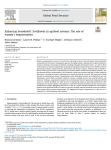Cavatassi R., Phillips L.M., Maggio G., Anteneh Z., Mabiso A. (2025). Enhancing households' livelihoods in agrifood systems: the role of women's empowerment. Global Food Security, 01/06/2025, vol. 45, p. 100856.
https://doi.org/10.1016/j.gfs.2025.100856
https://doi.org/10.1016/j.gfs.2025.100856
| Titre : | Enhancing households' livelihoods in agrifood systems: the role of women's empowerment (2025) |
| Auteurs : | R. Cavatassi ; L.M. Phillips ; G. Maggio ; Z. Anteneh ; A. Mabiso |
| Type de document : | Article |
| Dans : | Global Food Security (vol. 45, June 2025) |
| Article en page(s) : | p. 100856 |
| Langues : | Anglais |
| Langues du résumé : | Anglais |
| Catégories : |
Catégories principales 14 - SOCIOLOGIE ; 14.6 - Rôle de la FemmeThésaurus IAMM SYSTEME AGROALIMENTAIRE ; REVENU DES MENAGES ; AUTONOMISATION ; FEMME ; ROLE DES FEMMES ; PARTICIPATION DE LA FEMME |
| Résumé : | Women's empowerment is crucial not only for their well-being but also for the well-being of entire households, communities and economies. Closing gender gaps and increasing women's empowerment in agrifood systems is critical to achieving a broad range of objectives, including Sustainable Development Goals 1, 2, 5 and 10. Much of the literature on women's empowerment in agriculture and agrifood systems focuses on its benefits in terms of agricultural production, dietary diversity, child nutrition and women's nutrition. However, there is limited evidence on the impact of women's empowerment on outcomes related to livelihoods and resilience to shocks -- two key elements that drive improvements in the livelihoods of small-scale producers and help to further justify the importance of investing in women's empowerment to achieve development outcomes. This paper aims to bridge this gap by examining how women's empowerment within development projects in the agriculture and rural development sectors affects household livelihood outcomes including income, food security/nutrition and resilience. Utilizing a comprehensive dataset from the International Fund for Agricultural Development (IFAD) across 23 countries worldwide, we assess the role of empowering women in improving livelihoods for their households. Our analysis employs a dual approach: a meta-level evaluation focusing on project outcomes and a household-level analysis aggregating data from 21 of the 23 countries available. Results from both analytical methods reveal significant benefits to livelihood outcomes, including enhanced household income and resilience, where women report increased empowerment. This suggests that women's empowerment is a key area of investments for rural development and prosperity. |
| Cote : | Réservé lecteur CIHEAM |
| URL / DOI : | https://doi.org/10.1016/j.gfs.2025.100856 |







